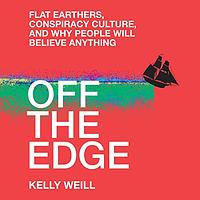You need to sign in or sign up before continuing.
Take a photo of a barcode or cover
203 reviews for:
Off the Edge: Flat Earthers, Conspiracy Culture, and Why People Will Believe Anything
Kelly Weill
203 reviews for:
Off the Edge: Flat Earthers, Conspiracy Culture, and Why People Will Believe Anything
Kelly Weill
If you're at all familiar with flat earth or the conspiracy theories that have permeated American politics there is nothing new or useful here.
reflective
slow-paced
I went into this hoping for a psychological expose on why humans think the way they do, why we crave the need for conspiracies, maybe some trends in how the thinking follows... I guess we sort of get that here...it’s more of a journalist’s own journaling of her times at conventions, gatherings and some contacts she knew. Which is not to take away from it, but it left me sort of disappointed with the shallowness of the critique. Often it feels like she’s giving them far far too much of an easy out. I was looking (with my own bias i recognize) for someone to finally take this movement to task and really hold it up to the fire in what it does and put it to reason. But I suppose that’s not her job. She does explain some of the ‘how’...basically just telling us about youtube rabbit holes multiple times. The Facebook groups and the like are touched upon as well, but it’s nothing...new. We get a good look at Flat Earther culture, their weirdo habits and their ignorance, and almost desire to close themselves off into a bubble. So I will 100% give her credit on this. And for that matter she clearly put herself deep in the weeds to get close with some of them. Going to conventions and actually talking to these idiots is something I’d never subject myself to... So clearly investigative journalism is not my forte and I give them all the credit. But speaking of journalism I was hoping there’d be a lot more speak about media opinion, and mass shaping of opinion over all not just all Flat Earther. There are some fringe mentions, Trump is brought up a lot and the Anti-Vax movement plays heavily, but it just all seems very surface level. The book doesn’t offer a case study or anything psychological but more so just a ‘man on the street’ level look.
It’s good, it’s fine, it has it’s moments of interest and some repetitive notes that create a ‘yea yea we get it’ from me. Overall I liked it, but it wasn’t challenging as I was hoping. No one in this book felt like they were in the wrong or made to really reflect on their poor choices. Maybe that’s on me, maybe the book *should* be written more in a clinical journalistic manner with no bias. But the sympathy angle is played up for them and it feels like there’s an attempt to....not justify but allow them to ‘Do you”.
It’s good, it’s fine, it has it’s moments of interest and some repetitive notes that create a ‘yea yea we get it’ from me. Overall I liked it, but it wasn’t challenging as I was hoping. No one in this book felt like they were in the wrong or made to really reflect on their poor choices. Maybe that’s on me, maybe the book *should* be written more in a clinical journalistic manner with no bias. But the sympathy angle is played up for them and it feels like there’s an attempt to....not justify but allow them to ‘Do you”.
It was interesting enough, but I wish I took more from the book. I was really hoping to come out understanding why people fall into conspiracies, especially something as wild as the earth being flat. What makes someone believe something like that, esp when they scoffed at the concept once before. Naive of me to expect one book to answer that, I know lol. What I gathered is what I already figured. If there are already cracks in either understanding or trust or paranoia, it's easy to fall into other conspiracies like flat earth, Qanon, anti-Semitism, etc. I appreciated reading about the history of flat earth and of other surrounding conspiracies. Interesting read, I got sucked in pretty easily and read for the whole of like 3-4 days straight, but can't say it'll stick with me.
Wellll. I had always kind of assumed most "flat earthers" were cranky people just trying to get a rise out of the rest of us. Guess I'm wrong. Terrifyingly wrong. I am . . . nearly speechless. The author hinted at reasons why people may go down these kinds of holes--but what makes some do it and some do not? Many people are stressed out right now. I also appreciated the ideas on helping someone "land softly" but hope there will be more research and other books about these ideas. Because
“It's easier to fool people than it is to convince them that they have been fooled.” – Mark Twain
I kept thinking of this quote as I read OFF THE EDGE, and after the last 16 years of seeing friends and family fall for crazy conspiracy theories I believe it is true.
The author begins with the history of the Flat Earth movement in the 1800s and moves it through the age of InfoWars and YouTube. Along the way she discusses the history of conspiracy theories (almost all tied to antisemitic tropes) and how the age (and algorithms) of the internet helped them all find each other.
The only advice she offers regarding "saving" those enmeshed in conspiracies is to try to maintain the relationship/friendship so that you can offer a hand when they're ready to climb out of the pit.
I kept thinking of this quote as I read OFF THE EDGE, and after the last 16 years of seeing friends and family fall for crazy conspiracy theories I believe it is true.
The author begins with the history of the Flat Earth movement in the 1800s and moves it through the age of InfoWars and YouTube. Along the way she discusses the history of conspiracy theories (almost all tied to antisemitic tropes) and how the age (and algorithms) of the internet helped them all find each other.
The only advice she offers regarding "saving" those enmeshed in conspiracies is to try to maintain the relationship/friendship so that you can offer a hand when they're ready to climb out of the pit.
challenging
reflective
medium-paced
Moderate: Death, Antisemitism, Religious bigotry
Minor: Transphobia
In another decade this book might have been lighthearted fun. The sad truth of now is that we have very little culturally agreed-upon tenets, and that makes this peek into the worlds of people - our contemporaries, not just in the past - who take their disbelief to some of the very fundamentals more than entertainment. I'm not sure that this book ever really gets us to why people believe anything, though it sheds light on how they arrive at extreme conclusions. I very much appreciate that Weill discussed the connections between flat earthers, anti vaxxers, and white supremacists (and also that there isn't always a 1:1 correspondence). These aren't dumb kooks for us to laugh at but fellow citizens who vote, exercise influence, and incite violence. We can't be complacent.
Both informative and terrifying. Our world is so weird and getting weirder by the day and not in good ways.





